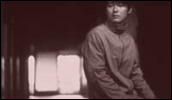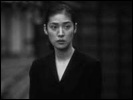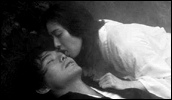Inugami
- Year
- 2001
- Original title
- Inugami
- Japanese title
- 犬神
- Director
- Cast
- Running time
- 105 minutes
- Published
- 15 August 2001



by Robin Gatto
Another great taboo film by Japanese cinema's current taboo breaker? Or just another overblown smorgasbord by a style-obsessed filmmaker ? Inugami is not just a film, it is an experiment in styles and whims by a director whose complex personality and background make him both honest and exigent in his art and overtly ambitious in his intentions.
Derided for his overweight as an adolescent, Masato Harada found refuge and release in cinema. He moved to Tokyo after his studies in the hope of becoming a director, but found no solace in the antiquated system of studio-bound apprenticeships. He chose to head abroad, first to England and then to the USA, where he found a more receptive attitude for his cinematic preferences (science fiction, adventure, epics) culminating in a father/son relationship with Howard Hawks.
However, Harada made his directorial debut not in the land of his dreams but in his native Japan. But back on his home ground, his American-born children had to face ostracism for simply being different. Ever since, Masato Harada has been both an angry and a sad man. Angry at the ailments of his native society - like the racism his children were suscepted to or the phenomenon of teenage prostitution, which he indicted in Kamikaze Taxi (1995) and Bounce Ko Gals (1997) - and sad to see his most entertaining films (Gunhed, Painted Desert, and Rowing Through) fail to get him closer to American movie shores. In fact, Harada calls Painted Desert a wasted "calling card to Hollywood", while Gunhed ended up on the American market as an Alan Smithee film.
Inugami is yet another display of the director's artistic exigence and international ambitions. Surfing on the last waning waves of the Asian psycho-horror boom, Inugami is probably the most visually impressive of them all. It is a ghostly family drama that plunges into some of the darkest recesses of Japanese traditions with the polished elegance of a Mizoguchi or Shindo and the thrilling panache of a new master.
The story itself is a take on the Oedipus myth, with Atsuro Watabe as the man who sleeps with his mother (Yuki Amami) and eventually kills his father. But the film doesn't follow the moral of the myth, in which Oedipus ends up as a lonely man on the road to redemption. In Inugami, the incestuous relationship is not a curse but a liberation, a departure of sorts from the seclusion of a clannish family, where blood relations are the rule. This is probably the greatest irony of the film, and Masato Harada must have been pleased to emphasise the taboo of incest. "What Japan needs now is taboo breakers" he says dauntlessly.
Too bad Harada forgot that, when not careful, style can easily take over story. Consequently, the taboos dissected in Inugami will probably only have an impact on those willing or able to see beyond the dazzling display of technical bravura. Harada obviously enjoyed filming the cedar forests of his childhood; he has stated that his primary wish behind this film was "to have 95% of the shots carry something about wood". Fulfilling this particular wish, Harada films these vast forests like a Tolkien adept, and adds to the gamut of sexually-tinged forest fantasies (like Sam Raimi's The Evil Dead and William Friedkin's The Guardian) a sizzling love-making session between Atsuro Watabe and Yuki Amami inside a tree - a scene in which he employs wire camerawork reminiscent of the old Russian masters.
It is a shame, in view of the exciting fantasy and horror context, that Masato Harada doesn't make much of the titular Inugami (forest beasts that have long graced Japanese art, from Hayao Miyazaki's Princess Mononoke to a play for masks written by Shuji Terayama). Having shown us their powerful presence in the magnificent aerial overture of the film, Harada gradually shears through the exciting fantasy element to leave only the symbol. A symbol of segregation and hatred in an antiquated Japan that glorifies the clan and the race. But it is so botched by the script and so diluted in the imagery that it fizzles out long before the end. And when their presence is actually felt, the displays of inugami power take the shape of ineffectual giallo-style shock scenes which Harada's son, a big fan of Dario Argento, added to the script.
Where Inugami really stands out is in its female cast. Harada seems a very deft hand when it comes to casting the female roles of his films - who could forget his trio of bouncy kogals, for instance? In Inugami, Masato Harada couples veteran jidai geki actress Shiho Fujimura (of the Zatoichi and Nemuri Kyoshiro series) with ex-Takarazuka revue artist Yuki Amami, a tall, slender woman also seen in Takashi Ishii's Black Angel 2 (Kuro no Tenshi Vol. 2, 1999) and Rendan (2000), Naoto Takanaka's Nippon version of The War of the Roses. In Inugami, Yuki Amami first appears as a 50-year old spinster before going through an impressive 25-year rejuvenation set to tickle your senses. It must have been a real pleasure for the actress to portray a truly sensual heroine after having played so many men in the Takarazuka revues. For Harada, "Inugami also deals with a kind of Hitchcockian heroine, in which an interesting-looking woman -- who has given up her sensuality -- transforms herself into a sensual, attractive woman." Yuki Amami certainly is that.
Released in January 2001, Inugami had a fair box office run, lapping up a $2 million gross. (In comparison, Kiyoshi Kurosawa's Pulse, which was targeted even more clearly at the Ring audience, barely topped the $500,000 mark). It achieved this result despite being rated R-15 for its taboo central theme and was therefore shorn of a potential bigger, family audience.
The inconclusive theatrical run of the film did not prevent it from touring world festivals, beginning with a prestigious Berlin selection which seemed to leave both the audience and the critics puzzled. Probably feeling more bitter than ever, Harada explained how, for him, this film was for the overseas audience, to reach the Berlin Film Festival competition and maybe, again, launch a more international career. Perhaps somebody should advise him to pair up with with producer Takenori Sento, whose efforts to reach foreign audiences have proven more successful.
What eventually remains of the experience of watching Inugami is the feeling of sheer pleasure with which Harada has handled his bundle of images and concepts. A visual maestro, Harada knows how to create excitement and wonder with his camerawork, but fails to sustain much interest in the overabundance of characters, or achieve an effective narrative build-up. I see Masato Harada as a proud navigator of the most daunting seas, but with too many alluring sirens around his vessel, delaying his journey to the greatest lands. But I guess it's just a short matter of time before Harada sails again into some truly great works.